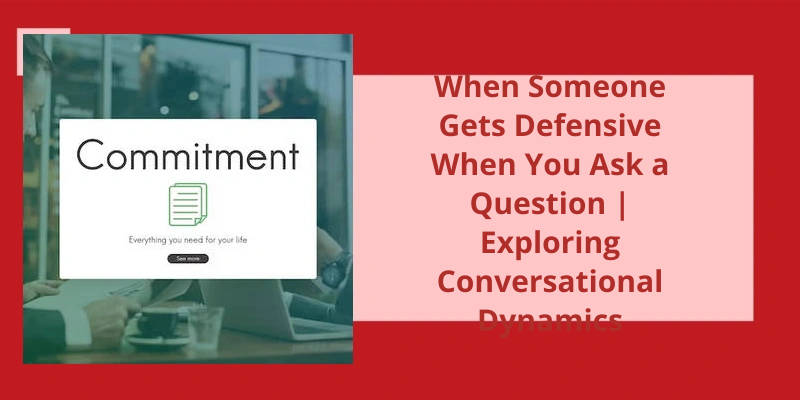In such instances, responding with further criticism or aggression is likely to escalate the situation, leading to stonewalling or an all-out argument. Instead, it’s essential to approach the conversation with empathy and genuine concern for the other person's emotional state. By acknowledging and validating their feelings, you can create a safe space for open and honest communication, fostering a greater understanding and resolution of the underlying issue at hand.
Why Does a Person Get Defensive When Asked a Question?
When someone gets defensive when asked a question, it can stem from various underlying factors. One possible reason is a lack of skills to communicate in an assertive way. If a person struggles to confidently express their thoughts and opinions, they may perceive questions as challenges or threats to their beliefs. In such cases, defensive behavior becomes a shield to protect their fragile self-esteem.
Furthermore, feeling anxious in social situations can also contribute to defensive reactions. When individuals who struggle with social anxiety are asked questions, they may interpret them as potential judgment or criticism. This perception triggers their defensive response, as they try to guard themselves from perceived threats to their self-worth.
Another factor that may lead to defensiveness is a reaction to shame or guilt. If someone is feeling remorseful or guilty about something, and another person brings up a related topic through a question, it can unintentionally trigger a defensive response. This defense mechanism serves as a way to protect oneself from facing and addressing their feelings of shame or guilt.
Moreover, a persons defensiveness could be influenced by past experiences or trauma. If they’ve encountered situations where questioning resulted in negative outcomes or caused emotional distress, they might become hypersensitive to questions. This hypersensitivity can manifest as defensiveness, as they try to avoid reliving past painful experiences.
It can be rooted in a lack of assertive communication skills, social anxiety, shame or guilt, past experiences or trauma, and the fear of judgment or rejection. Recognizing these underlying factors and approaching conversations with empathy and understanding can help foster more open and constructive dialogue.
Strategies for Managing Defensiveness in Oneself and Others
- Practice active listening and empathy
- Acknowledge and validate emotions
- Encourage open and honest communication
- Focus on problem-solving rather than blaming
- Use “I” statements instead of “you” statements
- Avoid judgment and criticism
- Provide constructive feedback
- Create a safe and non-threatening environment
- Develop self-awareness and emotional intelligence
- Encourage self-reflection and self-monitoring
- Teach and promote conflict resolution skills
- Encourage healthy confrontation and assertiveness
- Offer support and resources for personal growth
- Set clear boundaries and expectations
- Lead by example and foster a culture of openness
- Collaborate and find win-win solutions
Conclusion
Recognize that their defensiveness may be rooted in feelings of shame, hurt, guilt, or feeling attacked. Instead of responding with criticism or pushing for answers, show genuine concern for the other person's emotions and the situation they’re experiencing. By demonstrating empathy, you can foster a more open and productive conversation, leading to better understanding and resolution.






